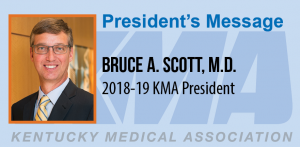Posted July 25, 2019
 Today’s health care landscape is evolving rapidly, diverging from years past and presenting new realities for patients and physicians alike.
Today’s health care landscape is evolving rapidly, diverging from years past and presenting new realities for patients and physicians alike.
Policymakers at the state and federal levels have been quick to call for and implement changes that directly impact physicians and how we deliver care in communities across Kentucky and throughout the United States.
In the wake of these changes and with more to come, physicians have a responsibility to advocate for their patients—not just within the walls of our offices or even on the phone during our regular battles with insurance carriers, but also in the public policy arena. These days, advocacy comes in many forms. From submitting letters and opinion pieces to your local newspaper, to testifying at the State Capitol and tweeting at legislators, there are many ways physicians can have a voice in the debates and discussions impacting patient care.
As president of the Kentucky Medical Association, I am proud of the well-developed physician advocacy community we’ve built in our state. The KMA has given physicians an opportunity to play a significant role in highlighting and addressing some of the most important health care issues facing Kentucky and our nation. For instance, the KMA was part of a robust—and highly successful—advocate-driven effort to reform Kentucky’s outdated prior authorization processes and ensure patients can promptly access the care and treatment that has been prescribed to them.
Last year, our “Focus on Flu” campaign was critical in dispelling common myths about the flu and flu vaccine and educating Kentuckians on best practices for preventing the spread of the disease. We have also been at the forefront of other public health and advocacy initiatives surrounding the opioid crisis and smoking cessation, all of which were part of our multi-year “AIM for Better Care” initiative that focuses on specific public health issues. Who better to lead these initiatives than the physicians interacting with patients every single day?
For many years, doctors have served a vital role in our communities that extends far beyond prescribing medications and repairing broken bones. Our medical expertise, coupled with our everyday experiences and interactions, put us in a unique position to advocate for the individuals in our care while educating legislators and other public officials, as well as the public. We plan to do just that this fall when Kentucky Educational Television will air a townhall meeting with physician members regarding public health issues. This will provide an invaluable opportunity for the people of Kentucky to hear directly from physicians about the most pressing public health issues.
Each of us has taken an oath to act in the best interests of our patients, and advocacy is a vital part of the equation. I encourage my fellow physicians to get engaged in the discussions and debates impacting care delivery. Listen to your patients. Listen to your staff. And then take the time to talk to elected leaders about what’s happening on the frontlines.
The future of our profession and the care of our patients depends on it.

